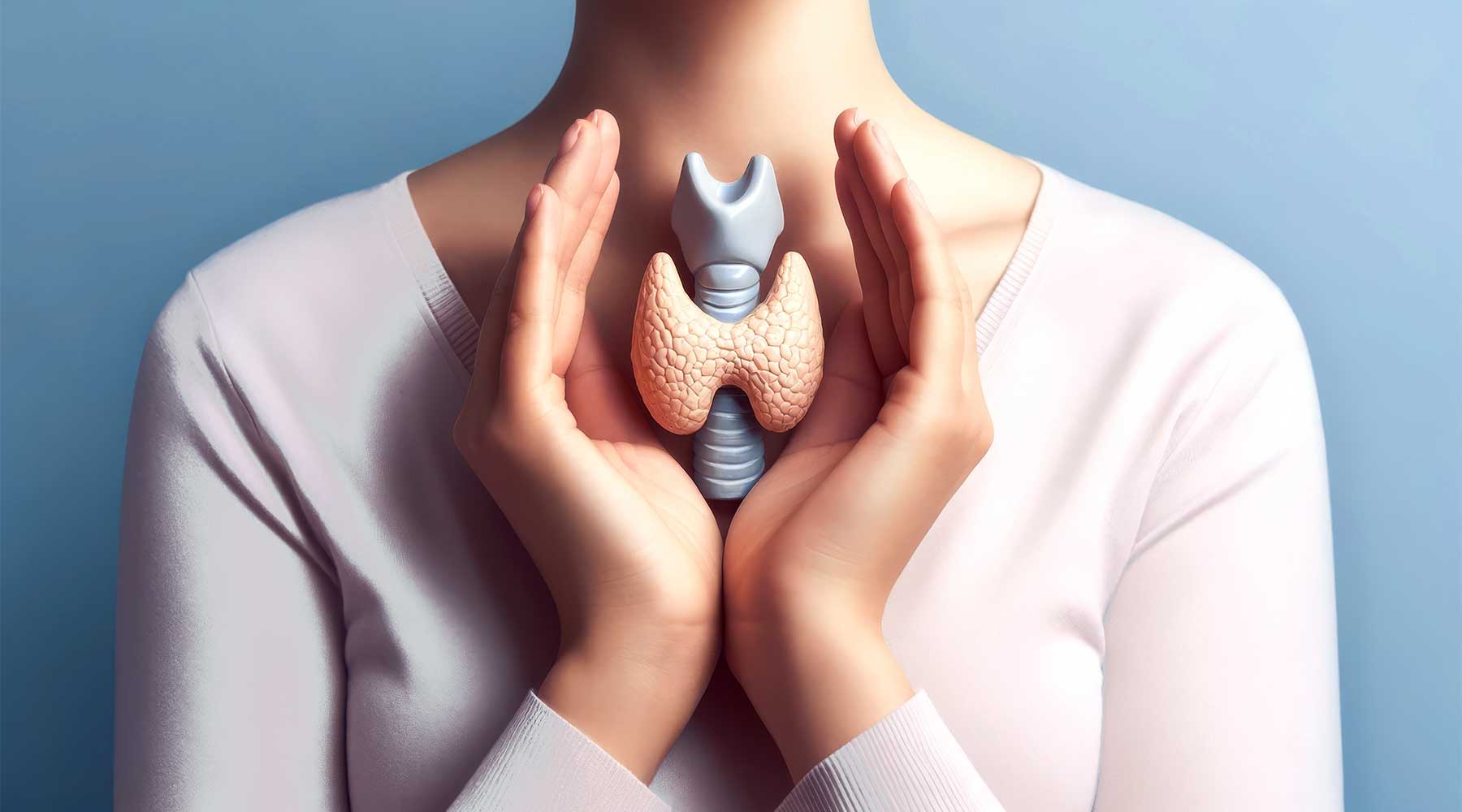
The thyroid and sleep disorders
Overactive or underactive thyroids are common and can cause various sleep disorders. Here we explain how the thyroid works and why it affects sleep.
Table of contents
- The thyroid gland and its function
- Thyroid dysfunction (hyperthyroidism/hypothyroidism)
- Interaction between sleep and thyroid
- Sleep disorders due to thyroid diseases
- Conclusion
1. The thyroid gland and its function
The thyroid is a small but incredibly important organ located in the front of the neck, close to the larynx and trachea. It produces vital neurotransmitters that are crucial for almost all bodily functions. The best-known thyroid hormones are triiodothyronine (T3) and thyroxine (T4). They are formed from the element iodine and other substances. The production of these hormones is controlled by the brain via the neurotransmitter TSH released there. Iodine is an essential trace element that cannot be produced by the body. Adequate intake through the daily diet is therefore essential.

Thyroid hormones are an important part of hormonal balance and influence many bodily processes, such as heart activity and blood pressure. They activate various metabolic processes and influence kidney and intestinal function. They are also important for body and organ growth and healthy brain function. The small thyroid gland therefore bears a major responsibility for maintaining vital processes.
2. Thyroid dysfunction
There are two types of thyroid dysfunction: hypothyroidism and hyperthyroidism. If too few or too many thyroid hormones are produced, the entire hormonal system becomes unbalanced. This leads to limitations in numerous bodily functions and significant impairment of health. Nowadays, thyroid dysfunction can usually be treated. medicinal be treated well.
↓ Underfunction (hypothyroidism)
In hypothyroidism, the thyroid produces fewer hormones than needed. This slows down metabolism and many important bodily functions. Physical and mental performance decreases, and those affected often suffer from listlessness. depressive moods, loss of appetite and a reduced immune system.
Hypothyroidism can result from a persistent iodine deficiency, an anatomical reduction of the thyroid, or inflammation of the thyroid tissue as a result of the autoimmune disease Hashimoto's thyroiditis. It is often treated with supplemental intake of the deficient hormones.
↑ Overactivity (hyperthyroidism)
In hyperthyroidism, the thyroid produces too many hormones. The excess of T3 and T4 accelerates metabolism to an abnormal level. This often leads to weight loss, cardiac arrhythmias, inner restlessness, nervousness, and difficulty concentrating.
Hyperthyroidism often results from the autoimmune disease Graves' disease or from a condition called autonomy, in which the thyroid is no longer controlled by the brain but instead initiates hormone production partially independently. To prevent hormone excess, there are various methods that help inhibit the organ's overproduction.
3.Sleep disorders due to thyroid diseases

The thyroid gland has a major impact on health and sleep. Sleep disorders can have direct organic or psychological causes. Both of these factors can be affected by thyroid dysfunction and contribute to the development of difficulty falling asleep and staying asleep, or to secondary conditions such as sleep apnea.
Sleep disorders due to hypothyroidism
Insomnia: The slowed metabolism leads to increased fatigue, lack of energy, and a lack of motivation. This increases the subjective need for sleep in those affected because there is insufficient energy available. Symptoms such as depressive moods, loss of appetite, and feelings of cold disrupt natural sleep patterns. They prevent the body from properly resting and falling asleep despite persistent fatigue. Despite increased fatigue, many affected individuals experience difficulty falling asleep, poorer sleep quality, and overall shorter sleep duration.
Sleep apnea: A lack of important thyroid hormones can lead to a decrease in breathing rate and a slower oxygen circulation in the body. This impedes healthy breathing and increases the risk of oxygen deprivation and sleep apnea during sleep.
Sleep disturbance in hyperthyroidism
Insomnia: Various studies show that elevated thyroid hormone levels are demonstrably linked to the severity of sleep disturbances. Increased activity levels and accelerated metabolism are typical symptoms of hyperthyroidism, which make it difficult to fall asleep at night. Nervousness, anxiety disorders, or depressive moods also negatively impact sleep patterns, and an active digestive system can also interfere with falling asleep and staying asleep.
Sleep apnea: In cases of hyperthyroidism, the respiratory rate is usually increased, but the associated enlargement of the thyroid organ (also called goiter or struma) can lead to a narrowing of the airways.
4. Prevention of thyroid problems
When the thyroid disrupts hormonal balance, sleep also suffers. However, thyroid dysfunction isn't always easy to detect. Therefore, those suffering from persistent sleep disturbances can also examine their thyroid function.
Because thyroid hormones are involved in so many vital bodily functions, they should be monitored regularly anyway. With a balanced diet, we usually consume enough iodine to adequately supply a healthy thyroid. However, thyroid function can change with age, so regular checkups with your family doctor or endocrinologist are highly recommended.
5. Conclusion
-
The thyroid is an important organ that is involved in numerous body functions and metabolic processes through the thyroid hormones T3 and T4.
-
If the thyroid is underactive, metabolism slows down and performance decreases.
-
In the case of hyperthyroidism, the metabolism accelerates and restlessness, nervousness or cardiac arrhythmias can occur.
-
Thyroid dysfunction can promote the occurrence of sleep disorders such as insomnia or sleep apnea.
Best wishes and see you soon!


Leave a comment
This site is protected by hCaptcha and the hCaptcha Privacy Policy and Terms of Service apply.